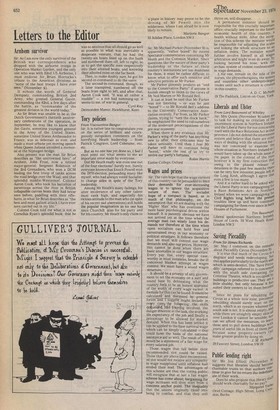Wages and prices
Sir: The vain hope that the wage earners of this country can bepersuaded to limit their demands for' ever-increasing wages is to ignore the acquisitive nature of man. The' socialist hope of a compact is based, as is much of that philosophy, on the assumption that we are dealing with the 'Higher Man' who has overcome the more basic psychological drives within himself. It is patently obvious we have not arrived yet at the time when the average man can wisely limit his demands nor therefore at the time when open socialism can hold free and unrestrained sway in our economy or political structure. It follows therefore that we must still control our wage demands and also our prices. However, this cannot be done when there are basic anomalies in our wages structure Every pay rise, every special case, worthy in most instances, breaks the ill conceived blanket attempt at wages control. We must have a sound wages structure.
It should be a priority of any government to set the economy on a sure and sound base by delineating what the
country feels to be an honest appraisal of the worth of every wage earner. A formula for this can be found. Itcould be
calculated and discussed by general forarand I' S'uggelI 'inight include in case; the folltwing: the' skills de an`ded, 'the binning involved, the danger inherent in the task, the working life expectancy of the job and finally a percentage to he allowed for market demand. When this has been settled it can be applied to the base survival wage which can be simply calculated this could form the basis of the national assistance aid as well. The result of this would be astatement of a fair wage for every salaried job. • Those wages that fall below their recommended 'slot could be raised. Those that are above their recommend ed slot would not receive any sympathy in wage reappraisal until inflation had eroded their lead. The advantages of this scheme are that the voting public will recognise that at last a fair wages scheme has come about; bargaining for wage increases will then start from a concrete .anchor point. The inequality that the unions originally came into being to combat, and that they still thrive on, will disappear.
A permanent minister should be responsible for this crucially important office; crucially important to the future economic health of this countrY, a health without strife. After the inceP,tion of this scheme the minister would be responsible for adjusting the scales and linking the whole structure to an inflation index. The minister wad further involve himself in all wages arbitration and might even do away, bY looking beyond his nose, with the archaic system of violent confrontation in wage demands. I, for one, remain on the side of the nurses, the physiotherapists, the miners and countless other underprivileged trades until such a structure is created in this country.
A. D. C. McNeire 19 The Paddock, Linton-on-Ouse, York


































 Previous page
Previous page